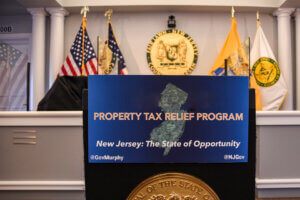Governor Corzine’s budget plan is not going over well with the New Jersey public who see it as a political deal that did not go far enough in finding spending cuts. Most New Jerseyans are aware of the state’s larger-than-average budget deficit, although only 1-in-4 has actually heard “a lot” about Governor Corzine’s plan to close it. While New Jerseyans do not like what they have heard about this budget package, many are already preparing themselves to live with it.
The problem, as residents see it, is that the governor has taken an extraordinary problem and met it with timeworn political solutions. By a 2-to-1 margin, New Jerseyans describe the governor’s budget package as “more of the same old political dealings” (60%) rather than the “product of tough, thoughtful choices” (32%). Even the governor’s fellow partisans tend to see this budget as a political plan – 54% of Democrats say it is mainly the product of political deal making, along with 69% of Republicans and 62% of independents who feel the same.
Furthermore, the state isn’t sold on the need for a one cent increase in the state sales tax – the main lightening rod in the governor’s proposal. By a greater than 2-to-1 margin, residents who are aware of the budget believe that the governor should be able to find more spending cuts (66%) compared to those who agree with the necessity of raising the sales tax (29%). Again, this is the majority view of Democrats, Republicans and independents alike.
“Governor Corzine claims that he has scrubbed the budget and that some sort of tax increase is necessary to close the gap completely. That message has not been sold to the state’s residents,” observed Patrick Murray, director of the Monmouth University Polling Institute.
Overall, more than 8-in-10 New Jerseyans have heard about the state’s budget deficit. Among this group, 60 percent are aware that it is larger than normal. About 3-in-4 residents have heard something about Governor Corzine’s proposed budget, although only 25 percent say they have heard a lot about it.
Among those who are aware of the budget plan, only 1-in-10 (10%) are satisfied with the job Governor Corzine did trying to close the gap compared to 41 percent who are decidedly dissatisfied with the proposal. Nearly half (45%) say they are not particularly happy about the budget but can live with it.
When the impact of the budget is broken down, there is very little that New Jerseyans see as a positive. More than two-thirds say an increase in the sales tax will cause them some financial hardship, including 30 percent who say it will pose a “lot” of hardship to their family. Households with incomes below the state median will be hardest hit – 43 percent of those earning less than $50,000 a year say a one cent increase in the sales tax will cause them a lot of hardship compared to about 1-in-4 families earning $50,000 or more.
Among those aware of the budget plan, a majority say it does a “bad job” at keeping tax increases to a minimum (54%) and providing property tax relief (53%). Only about 1-in-5 feel the governor’s budget does a “good job” in these areas.
Likewise, more residents feel that the proposed budget does a bad job rather than good job when it comes to being fair to the middle class (43% bad to 24% good), being fair to the poor (35%-22%), providing funding for schools (35%-29%), and cutting waste and fraud (33%-26%).
Murray remarked, “The governor campaigned on his ability to avoid tax increases and specifically to restore property tax rebates. His inability to do so in his first budget, regardless of the circumstances, is not going over well with the public.”
Residents are split on whether the governor’s plan does a good or bad job at promoting economic growth (27%-28%) and avoiding the use of one-time financial gimmicks to balance the budget (27%-25%). The only area where more New Jerseyans see the budget doing a good rather than bad job on the environment (35%-16%), although half have no opinion on this.
The Monmouth University/Gannett New Jersey Poll was conducted by telephone with 803 New Jersey adults from April 17 to 20, 2006. This sample has a margin of error of ± 3.5 percent. Most of the findings in this release are based on a sub-sample of 613 residents who are aware of the budget plan. These results have a ± 4 margin of error. The poll was conducted by the Monmouth University Polling Institute and originally published by the Gannett New Jersey newspaper group (Asbury Park Press, Courier-Post, Courier News, Daily Journal, Daily Record, Home News Tribune, and Ocean County Observer).
DATA TABLES
The questions referred to in this release are as follows:
(* Some columns may not add to 100% due to rounding.)
1. How much have you heard about the state’s budget deficit – a lot, a little, or nothing at all?
|
TOTAL | REGISTERED VOTER |
PARTY ID | ||||
|
Yes | No | Dem | Rep |
Ind | ||
| A lot | 42% | 47% | 25% | 41% | 46% | 42% |
| A little | 42% | 40% | 47% | 41% | 41% | 41% |
| Nothing at all | 17% | 13% | 28% | 17% | 13% | 17% |
| Unwtd N |
803 | 652 | 151 | 278 | 174 |
303 |
[The following question was asked only of those aware of the deficit]
2. Would you say the current state deficit is larger, smaller, or about the same as in past years? [Is that a lot or a little?]
|
TOTAL | REGISTERED VOTER | PARTY ID |
Aware of | |||||
|
Yes | No | Dem | Rep | Ind | Lot |
Little | ||
| Lot Larger | 34% | 36% | 25% | 27% | 37% | 39% | 45% | 23% |
| Little Larger | 26% | 27% | 23% | 30% | 23% | 23% | 22% | 30% |
| Smaller | 4% | 4% | 4% | 5% | 5% | 2% | 3% | 5% |
| About the Same | 28% | 26% | 37% | 31% | 27% | 28% | 26% | 30% |
| VOL Dont Know | 8% | 7% | 12% | 7% | 8% | 8% | 4% | 12% |
| Unwtd N |
697 | 584 | 113 | 238 | 158 | 262 | 371 |
326 |
3. How much have you heard or read about Governor Corzine’s budget proposals to deal with this deficit – a lot, a little, or nothing at all?
|
TOTAL | REGISTERED VOTER |
PARTY ID | ||||
|
Yes | No | Dem | Rep |
Ind | ||
| A lot | 25% | 28% | 12% | 23% | 30% | 25% |
| A little | 49% | 48% | 53% | 53% | 42% | 49% |
| Nothing at all | 27% | 24% | 36% | 24% | 27% | 26% |
| Unwtd N |
803 | 652 | 151 | 278 | 174 |
303 |
[The remaining questions 4-8 were asked only of those aware of the governor’s budget plan]
4. How would you describe your reaction to the governor’s budget plan – would you say you are satisfied with it, not particularly satisfied but you can live with it, or you are definitely dissatisfied with it?
|
TOTAL | REGISTERED VOTER | PARTY ID |
Aware of | |||||
|
Yes | No | Dem | Rep | Ind | Lot |
Little | ||
| Satisfied | 10% | 10% | 12% | 11% | 9% | 10% | 14% | 9% |
| Can live with it | 45% | 44% | 48% | 60% | 27% | 38% | 37% | 49% |
| Dissatisfied | 41% | 42% | 35% | 27% | 57% | 47% | 47% | 37% |
| (VOL) Dont know | 4% | 4% | 5% | 2% | 6% | 5% | 1% | 5% |
| Unwtd N |
613 | 510 | 103 | 219 | 133 | 231 | 220 |
393 |
5. In general, would you describe the governor’s budget plan as: the product of tough, thoughtful choices – or – more of the same old political dealings?
|
TOTAL | REGISTERED VOTER | PARTY ID |
Aware of | |||||
|
Yes | No | Dem | Rep | Ind | Lot |
Little | ||
| Product of tough, thoughtful choices | 32% | 31% | 34% | 39% | 25% | 29% | 40% | 28% |
| More of the same old political dealings | 60% | 61% | 57% | 54% | 69% | 62% | 56% | 63% |
| (VOL) Dont Know | 7% | 8% | 10% | 7% | 7% | 10% | 4% | 9% |
| Unwtd N |
613 | 510 | 103 | 219 | 133 | 231 | 220 |
393 |
6. Governor Corzine says his budget plan tries to spread the cost of closing the budget gap. For each of the following, please tell me if you think the budget does a good or bad job, or if you haven’t heard enough yet to form an opinion.
| April 2006 | Good | Bad Job | No Opinion | (n)* |
|
|
| |||
| A. Keeping tax increases to a minimum | 21% | 54% | 25% | (613) |
| B. Promoting economic growth | 27% | 28% | 45% | (293) |
| C. Cutting waste and fraud in state government | 26% | 33% | 41% | (293) |
| D. Being fair to the middle class | 24% | 43% | 33% | (293) |
| E. Being fair to the poor | 22% | 35% | 42% | (293) |
| F. Providing funding for schools | 29% | 35% | 36% | (320) |
| G. Providing property tax relief | 16% | 53% | 30% | (320) |
| H. Not relying on the one-time financial gimmicks | 27% | 25% | 49% | (320) |
| I. Protecting the environment | 35% | 16% | 49% | (320) |
[*Most items were asked of a random half of the sample]
7. A key component of the governor’s budget plan is to raise the state sales tax by one cent from 6 cents to 7 cents. Do you think it is necessary to raise the sales tax in order to balance the budget or should the governor be able to find more spending cuts?
|
TOTAL | REGISTERED VOTER | PARTY ID |
Aware of | |||||
|
Yes | No | Dem | Rep | Ind | Lot |
Little | ||
| Necessary to raise sales tax | 29% | 30% | 25% | 36% | 21% | 28% | 36% | 26% |
| Be able to find more spending cuts | 66% | 65% | 70% | 60% | 75% | 65% | 60% | 69% |
| (VOL) Dont Know | 5% | 5% | 5% | 5% | 4% | 6% | 5% | 5% |
| Unwtd N |
613 | 510 | 103 | 219 | 133 | 231 | 220 | 393 |
8. How much of an economic hardship would such an increase in the sales tax cause your family – a lot, a little, or not really any hardship?
|
TOTAL | REGISTERED VOTER | PARTY ID |
INCOME | ||||||
|
Yes | No | Dem | Rep | Ind | <$50K | $50-$100K |
$100K+ | ||
| Lot of hardship | 30% | 29% | 35% | 28% | 28% | 34% | 43% | 28% | 22% |
| Little hardship | 40% | 41% | 38% | 36% | 43% | 41% | 36% | 44% | 37% |
| Not really a hardship | 28% | 29% | 25% | 34% | 28% | 25% | 20% | 28% | 40% |
| (VOL) Dont Know | 1% | 1% | 1% | 2% | 0% | 1% | 1% | 0% | 1% |
| Unwtd N |
613 | 510 | 103 | 219 | 133 | 231 | 174 | 208 |
149 |
Results for this Monmouth University/Gannett NJ Poll are based on telephone interviews conducted by the Monmouth University Polling Institute on April 17-20, 2006 with a statewide random sample of 803 adult residents. For results based on the total sample, one can say with 95% confidence that the error attributable to sampling has a maximum margin of plus or minus 3.5 percentage points. Sampling error increases as the sample size decreases, so statements based on various population subgroups, such as separate figures reported by gender or party identification, are subject to more error than are statements based on the total sample. In addition to sampling error, one should bear in mind that question wording and practical difficulties in conducting surveys can introduce error or bias into the findings of opinion polls.
It is the Monmouth University Polling Institute’s policy to conduct surveys of all adult New Jersey residents, including voters and non-voters, on issues which affect the state. Specific voter surveys are conducted when appropriate during election cycles.
Click on pdf file link below for full methodology and results by key demographic groups.




